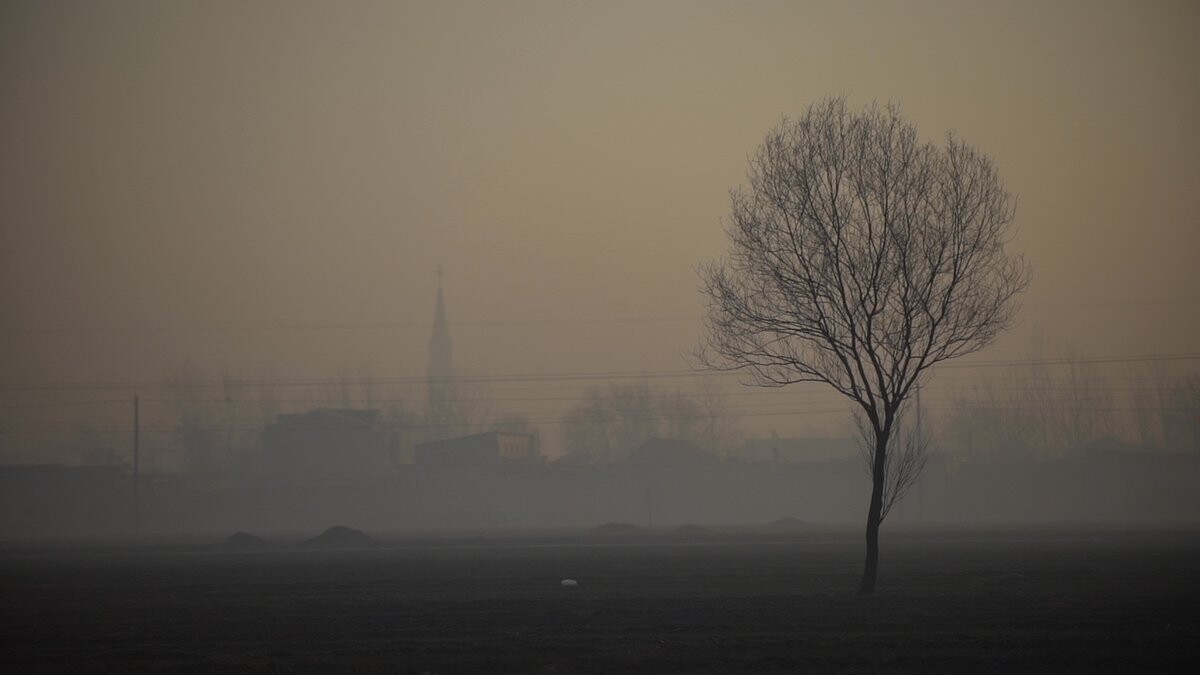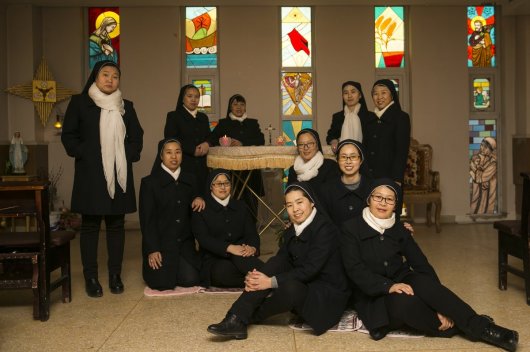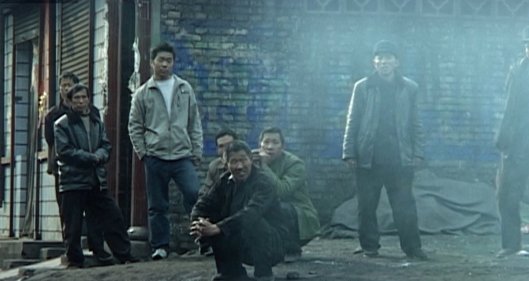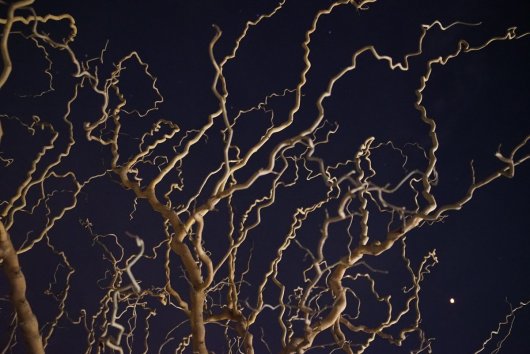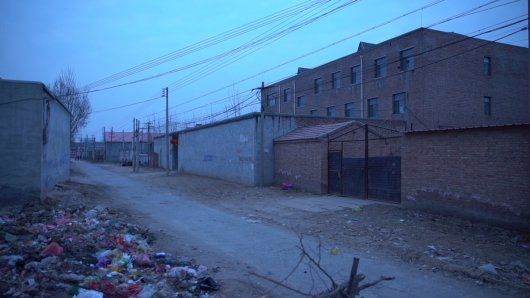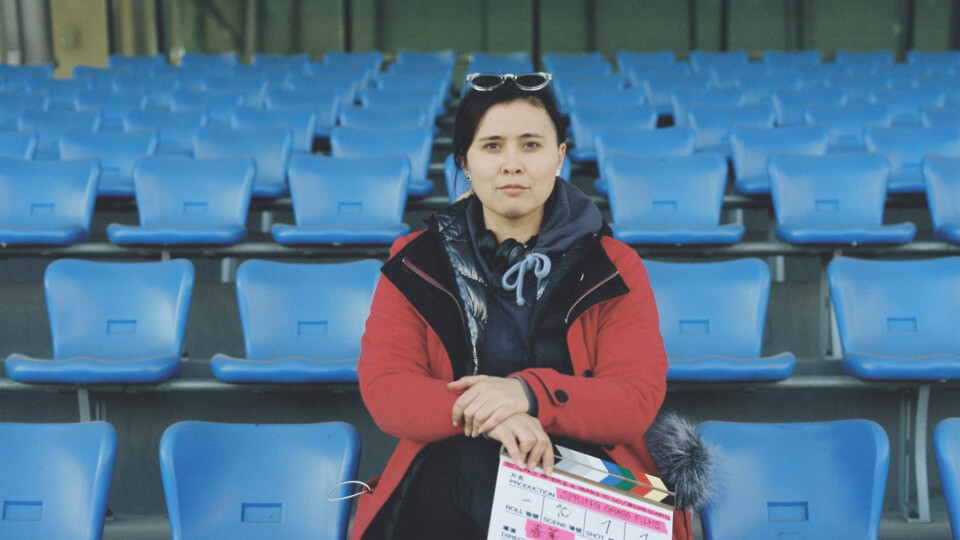Heaven over Today’s China
Heaven over Today’s China
Tomáš Etzler
It was never my plan or ambition to make a documentary film about China – the idea came completely spontaneously. Today, I see Heaven as a logical ending of my seven-year service of a correspondent in the Middle Kingdom.
I have always loved working as an editor and correspondent for both CNN and Czech Television – and also in China. My job brings me joy and satisfaction and I have always believed in it. But the essence of TV journalism can also be very frustrating in that the most powerful and interesting stories usually have to be crammed into a two-minute reportage. This is one of the reasons why I have always been attracted to documentary filmmaking.
As a matter of fact, Heaven is not my first documentary film. In 1999, I produced and directed Damaged Goods in the USA, a horrible account of international adoptions. The film made it to the International Independent Film & Video Festival in New York and was aired on public service TV stations in the USA, Slovenia, Norway, Sweden and Canada. Afterwards I was completely swallowed by work in the Middle East and in China where I spent many years as a correspondent.
In 2012 we were sitting with colleagues – producer Connie Young and cameraman Nathan Mauger – in our cockroach-ridden office in Beijing discussing how we’d love to shoot a documentary film if time and finances allowed. I thought that these two hindrances could be overcome if the film was shot within one week at a single location. This could give us an opportunity to produce solid material for a documentary film. Shooting at one location is simple in production terms and it saves time and travel expenses. I came up with two documentary topics – Afghani prison and Chinese orphanage. “Let’s start with the orphanage when we are China, what do you think?” It’ll be quick,” I ended the discussion. I couldn’t have been more wrong.
Heaven
Directing over the phone and coding programmes
It took us eight months until we found an orphanage that permitted us to shoot. Orphans are a sensitive topic in China as the vast majority of them are handicapped children or girls – the consequences of their one-child policy. Moreover, the situation in state-run orphanages is so disastrous that film crews are banned from shooting in these facilities. We managed to find an unofficial orphanage where we were allowed to make our film. We were extremely cautious not to be discovered by the police, which would get us and especially the orphanage in great trouble.
Four days later, we had enough material for a half-hour documentary that was accepted and edited by CNN, with voice-over by the station’s reporter Anna Coren. It was supposed to be broadcast at the time of Pope Francis’s first visit to Asia on January 15, 2015. A month before the scheduled screening, it was cancelled. To this day, I haven’t gotten any explanation from CNN. The Head of International Service once told me: “Look, Tomáš, some things just don’t turn out as they should.”
That hit me hard and it took me months to come to terms with it. I was convinced that the story was a powerful one and that the footage was worth it and it was really difficult to leave so many months of strenuous work behind. I mentioned the situation to a former colleague, creative producer Kateřina Ondřejková. I showed the film to her and she was excited about it. “You have to make it into a feature film, Tomáš!” She was trying to convince me. She suggested that we applied to IDFA in Amsterdam for a funding. I agreed and prepared all materials required for the application. Unfortunately, IDFA didn’t choose the film for their portfolio. That was another blow. I was trying to talk myself out of the project thinking that the film was cursed. But Katka insisted and introduced me to producer and founder of Mimesis Film, Jan Macola.
Heaven
Together with Jan, we applied to the State Cinema Fund for funding in the middle of 2016 and we were granted support. In January 2017, I went back to China to finish the shooting. But the political situation in China had greatly deteriorated. The Communist Party under the leadership of Xi Jin-ping intensified their repression against organisations that were not under its direct control, and shooting in an orphanage was riskier than five years earlier. Me and my team – Chinese producer and cameraman – came to the conclusion that my presence would be dangerous for the orphanage. So the two will go and shoot there without me. I spent several weeks with them describing my vision and the creative method. We were endlessly discussing what characters and stories to capture and how. We prepared all of the questions and interviews together.
The crew spent eleven days in the orphanage. The producer was sending me messages about the shooting and I communicated with her via telephone from my hotel in Beijing. We used coding programmes and often changed SIM cards in our phones to prevent the secret police from uncovering us through phone calls and e-mails. After the shooting, I spent the day with the producer watching the footage while she explained who was who in the individual scenes, what was their location and meaning. I copied the contents to another hard drive and left it with a friend in Beijing: “I’ll get back to you once I’m back in Czechia. You can then erase it and keep the hard drive.”
In Prague we spent some time discussing who should be the film’s editor. That was a completely unknown territory for me, as I didn’t know any editors in Czechia. At the end of 2017, Jan arranged an appointment with editor Adéla Špaljová in a café in Prague. After seeing the footage, Adéla said that although she had never seen any similar material, it could be the film’s plus and that she was in. At the time, I wasn’t aware that we will spend three years, on and off, in the editing room together.
Heaven
Better than Brad Pitt
In spring 2018, we got stuck with a 40 minute-long rough cut. Jan was helpless: “People just won’t get the message”. Fortunately, Lucie Tenney, an experienced producer and my partner, stepped in. With Lucie, we knew every frame in the edited and unedited footage by heart and we talked about the film on a daily basis. It became clear that our original concept focusing only on the orphanage does not work. Many things needed further explanation. One option was to add titles but we soon rejected the idea. We needed a voice over. I suggested my friends from CNN, but Lucie was insisting that it had to be my voice. I disagreed: the film is about an orphanage, not about myself. “Nobody will ever be able to put so much emotion and knowledge into it as you. You would be way better than Brad Pitt!”. She managed to convince me.
There are not many documentaries about China in general, let alone those produced in Czechia. After eight years of work, I can tell why. I’m happy that the film is finished and immensely grateful to all of those who helped bring it to the world. Thanks to the film I met great people in Czechia, enthusiastic professionals who taught me a lot. I only hope that the documentary will draw attention and that the story that I found in China will appeal to the audiences as much as it appealed to me.
Anything that happens in China affects the rest of the world
Adéla Špaljová
In 2016, I offered a lift to producer Jan Macola from the Ji.hlava International Documentary Film Festival. On our way home, he mentioned a footage shot by journalist Tomáš Etzler about a Christian orphanage in China that was worth editing. He thought I should see it and tell them whether it was good enough for a feature documentary. There were over 20 hours of footage in Chinese dialect with dozens of pages of rather amateurish translation.
However, the Chinese crew very interestingly managed to capture the life in the facility as if there was no camera. I could clearly see the stories of two girls who tried to live a full life despite their handicap, which – as I learnt later – is not very common in China.
And then I met Tomáš. I expected to meet an arrogant reporter from CNN, but I was very wrong. An incredibly humble, modest and sensitive guy came in. Tomáš is a fountain of all sorts of different stories and experience that he gained during his career is amazing! He is the soul of the film Heaven and I believe that the film also carries an imprint of his soul.
Heaven
Each editing day was filled with Tomáš’s stories about China and I was gradually putting together a mosaic of feelings about a country and its destructive regime that I found more and more repulsive. It was a film about a Christian orphanage which, however, didn’t absorb the atmosphere of the surrounding Chinese reality. To European audiences, this film shows a completely common nursing home for abandoned and handicapped children.
However, Chinese facilities of this type are not very similar to what we are used to here in Europe. A standard Chinese orphanage is a place of utter hopelessness with terrible living and dying conditions. We were trying to figure out how to tell the audience that what they can see is extremely rare in the dehumanized wasteland driven only by economic growth in which an individual, let alone a handicapped one, means almost nothing.
Tomáš showed me the footage from his reportages made during the seven years of his services in China. 300 hours of footage. While he was writing his commentaries, I was trying to break the compact narrative that was focusing on the orphanage with scenes from different reportages in order to create a film mosaic about China. But that didn’t work either. The film was lacking the charged emotions that Tomáš felt after his seven years in China. In the end, Lucie – Tomáš’s partner and our new script editor – came up with the brilliant idea: “Just say what you feel.”
A film is born in the editing room
Tomáš recorded his stories about China with director Petr Václav, creating another narrative line from his own perspective, parallel to the story of the orphanage.
They say – and other film professions please forgive me – that a film is born in the editing room. And in this case it definitely holds. I have never had so many different cuts of the same film at the editing stage. In 2020, when I sat down with a mask on my face in the mixing hall, I finally realized what this film was about. One of its opening lines says: “Anything that happens in China, affects the rest of the world.” I wrote to Tomáš, locked in quarantine, that he was a real prophet! Heaven is a film that comes at the right time. And thanks to those who feel the same way, including Jan Turek from Signal Generator and the fabulous PFX team, we managed to finish it. It is an honour to be a part of this documentary experience!
Translated by Viktor Heumann

